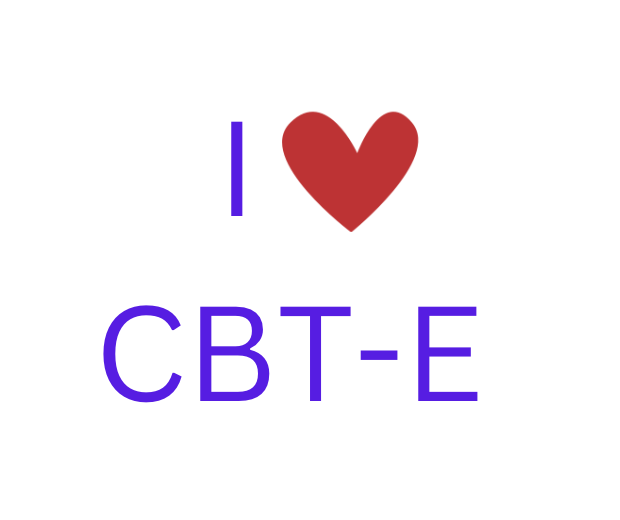Learn More About CBT-E
Learn about this potent intervention for eating disorders.
ENHANCED COGNITIVE BEHAVIORAL THERAPY
Cognitive Behavioral Therapy (CBT) is a popular therapy modality with adaptations to treat a wide range of mental health conditions including depression, anxiety, OCD and more. Broadly, CBT focuses on identifying patterns of thoughts, emotions and/or behaviors that negatively influence our lives. A form of CBT called Enhanced Cognitive Behavioral Therapy (CBT-E) is an adaptation of CBT designed to treat eating disorders.
An Overview of CBT-E
CBT-E is considered the first line, evidence-based treatment for people with eating disorders, including Anorexia Nervosa (AN), Bulimia Nervosa (BN), or Binge Eating Disorder (BED). Even though these conditions present with different problematic behaviors, at their core, they share many of the same foundational features. For example, people with AN, BN and BED often experience extreme concern with weight and shape and/or difficulty coping with negative emotions. These factors – “overvaluation” of shape and weight and mood intolerance – are common triggers to problematic eating behaviors like food restriction, binge eating or purging.While CBT-E is a manualized and structured treatment, it’s intended to fit the client “like a glove” with a focus on creating a personalized “formulation” or map of the client’s eating disorder and a customized plan for addressing their unique patterns and challenges.
The Four Stages of CBT-E
CBT-E moves through four distinct stages of treatment over the course of 20 to 40 weeks via regular outpatient therapy sessions. The longer treatment length is generally for those who need to restore weight (as with AN). CBT-E highlights the importance of “starting well” and building momentum at the start, so sessions are generally twice weekly for the first four to eight weeks, once weekly for roughly eight weeks, and then bi-weekly thereafter.
Stage One
The focus of Stage One is understanding and then systematically addressing the factors keeping the individual locked in their eating problem. The therapist guides the client in establishing a pattern of regular and consistent eating. The client learns how to effectively plan ahead, anticipate challenges and maintain a predictable routine of eating every few hours. This initial treatment stage is about education, building self-awareness and engaging in problem solving to avoid known triggers. We expect significant change during this brief initial period of about four to eight weeks.
Stage Two
Stage Two of CBT-E is just a session or two during which the therapist and client review progress, identify ongoing challenges and collaborate around building the plan for Stage Three.
Stage Three
Stage Three involves once weekly sessions that focus on factors that may be fueling remaining problematic eating behaviors. Typically, concerns with body weight and shape are addressed in this phase of treatment. There’s also a lot of attention focused on forms of over-control of food – like continued avoidance of certain foods, restriction of overall food quantity, etc. Stage Three also focuses on event and mood-related triggers to disordered eating.
Stage Four
During the fourth and final stage of CBT-E, the client and therapist begin to look ahead to the future and life post-CBT-E. The tasks of Stage Four are consistency, mindfulness and engaging strategies to reduce vulnerability to relapse in the future.
Get Connected with CBT-E
Interested in learning more about CBT-E and how it can help you or a loved one? As an evidence-based therapy modality, it’s important to find a therapist or treatment team who have experience with eating disorders. Columbus Park has been helping individuals break free from disordered eating since 2008 and CBT-E is our most frequently delivered treatment.
If you or a loved one is struggling with an eating disorder, please reach out to our team to discuss treatment options.

